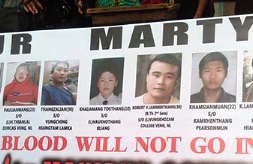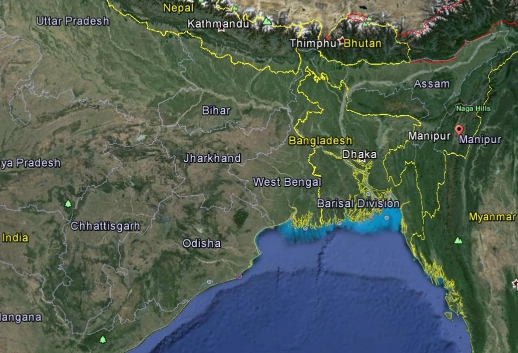
India’s north-east corner consists of seven states* linked to the rest of the country by a narrow strip of land: tribal peoples there perceive themselves to be very different – in culture, identity, and even looks – from the rest of India.
One state, Manipur, on the Myanmar border and about half the size of Switzerland, is made up of a valley surrounded by hills.
The majority Meitei people group have been Hindu for three centuries and live mainly in the valley. However, nearly all the (hill) tribal peoples (the Naga, Kuki and many others) are now Christian, at least in name, after the activities of Western missionaries who worked among them during the 20th century.
On 31 August the State Legislature passed three bills with the stated aim “to save the culture, tradition, identity and demographic structure of the indigenous people of the state”. They are the Protection of Manipur People Bill, the Manipur Land Revenue and Land Reforms (Seventh Amendment) Bill, and the Manipur Shops and Establishments (Second Amendment) Bill. However, tribal militant groups they will instead “legalise the tribal peoples’ marginalization”.
9 killed, 20 injured
During militants’ violent reaction in the town of Churachandpur, at least nine were killed and more than 20 injured, according to District Hospital officials.
Police reported that tribal crowds set fire to the homes of senior government officials, including the Minister for Family Welfare, Hill Area Committee Chairman, MP of Outer Manipur, and seven Legislators – all of tribal origin.
The crowds accused them of betraying their own people by failing to represent them in the Legislative Assembly. None of the government officials were hurt; they were all in the state capital, Imphal, at the time. Later, two unidentified charred bodies were recovered at two seperate sites.
The violence was deeply rooted in ethnic animosity between the Meitei and predominantly Christian tribal groups. Observers foresee the unrest escalating into an ethnic and religious clash if the state government fails to handle the matter well.
Eyewitnesses reported that armed men rushed to the arson sites and opened fire on militant protesters. Locals speculated that they were paramilitary insurgents from the Meitei (disguised as Manipur police commandos), because the bullets recovered were not the same as those issued by central government to state police.

This further increased the suspicions of militant tribals that the majority Meitei population is working with the state government to ostracise the tribal peoples.
Local government imposed a curfew from 31 August in an attempt to curtail further violence. A 12-hour bandh (road block) was called by activist tribal student organisations on 1 September, and student groups held a mass rally in the Indian capital, New Delhi, on 2 September. Meanwhile, Kuki tribal associations in the United States said they planned to organise a protest against the Bills in front of The White House in Washington D.C.
‘Things are getting worse’
An NGO worker, in Manipur for 10 years, said: “Things are getting worse. If this tension continues it will be trouble in the entire state, extending all the way to the Myanmar border. This may escalate into a large scale conflict between the majority Hindus and the minority tribal Christians.”
A Christian tribal pastor, who asked not to be named, added: “This might cause persecution and bloodshed for us minority Christians and tribal people.”
Manipur has been constantly disrupted in recent decades by separatist insurgencies, all with different and often competing agendas.
But with the resurgence of Hindu revivalism in mainland India, experts say that ethnic and tribal tensions in the north-east may take on new significance.
(*Arunachal Pradesh, Nagaland, Manipur, Mizoram, Tripura, Meghalaya and Assam.)